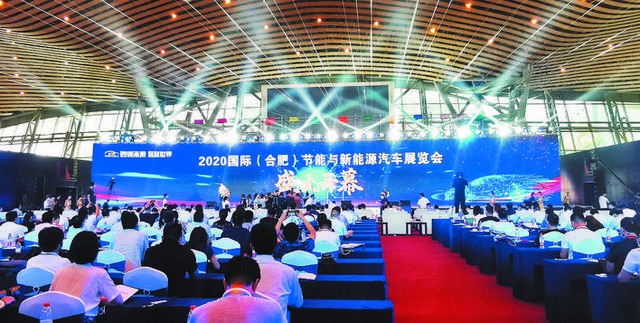On September 4, the 2020 International (Hefei) Energy-saving and New Energy Vehicle Exhibition opened at the Hefei Binhu International Convention and Exhibition Center. During the opening ceremony, the first batch of intelligent connected vehicle (ICV) open road test licenses in Hefei were issued to 12 companies, marking the first such licenses in Anhui Province. Additionally, the “White Paper on AI Business Applications in the Transportation Sector” was released at the event. Representatives from leading new energy and ICV companies such as NIO, Baidu, Huawei, and Didi Chuxing delivered keynote speeches. NIO founder Li Bin stated that Hefei has now become a hotspot of attention in the smart electric vehicle industry.
12 Companies Receive Anhui Province’s First ICV Open Road Test Licenses
The conference, themed “Intelligent Future and Connected World,” featured various formats such as ICV road demonstration (with the opening of Anhui’s first ICV demonstration line), an ICV ecosystem conference, and exhibitions on energy-saving and new energy vehicles and their supporting industries. These activities provided a platform to discuss and exchange the latest frontier technologies and integration methods in the ICV industry, showcasing the latest technological achievements in new energy vehicles, ICVs, and related industrial chains.
During the opening ceremony, Hefei issued its first batch of ICV open road test licenses. The 12 companies receiving these licenses were Baidu, Volkswagen, Didi, JAC, Ankai, Chery, NavInfo, Hailiang Technology, Shanghai SenseTime Lingang Intelligent Technology, Hangzhou Hongjing Zhijia, Yucheng Intelligent Technology, and Shanghai Xiancheng Intelligent Technology. These licenses, also the first in Anhui Province, allow these companies to conduct autonomous driving tests in Hefei.
It was noted that in the context of the Yangtze River Delta integration, an agreement has been reached for mutual recognition of ICV demonstration area licenses among the three provinces and one city in the region. This mutual recognition will significantly promote the development of ICV-related industrial chain companies, signifying a transition from the technical stage to market and commercial stages for ICVs.
NIO Headquarters’ Temporary Office Building to be Officially Operational in October
“Today, my identity is a bit different from before. As a Hefei-based company, I am one of the hosts welcoming everyone here,” said Li Bin, founder and chairman of NIO, during his keynote speech at the opening ceremony. Earlier this year, the agreement for NIO’s China headquarters to settle in Hefei was officially signed, aiming to build a leading enterprise with a trillion-yuan output in five years, accelerating the development of Hefei’s new energy vehicle cluster. Li Bin humorously referred to himself as a “host” while welcoming attendees.
Li Bin highlighted that since March this year, NIO’s product delivery volumes and new orders have consistently increased, a feat closely tied to the critical support provided by Hefei. “Last year was a year of ‘extreme pressure testing’ for NIO. During this critical period, Hefei continuously facilitated cooperation with us, leading to the signing of the framework agreement for NIO’s headquarters in February and the formal agreement two months later,” he said. The support from Anhui and Hefei has greatly boosted the confidence of NIO users. “In the past, many users believed that NIO’s cars were good but doubted the company’s long-term viability. Therefore, we are extremely grateful for Hefei’s support.”
Li Bin revealed that the construction of NIO’s China headquarters in Hefei is progressing rapidly. “In the Hefei Economic and Technological Development Zone, the temporary office building for NIO’s China headquarters is being renovated and is expected to be officially operational by October.” Additionally, recruitment and relocation of relevant staff are underway. Li Bin noted that NIO plans to expand its R&D team in Hefei, adding 700 positions by the end of this year and doubling that number by next year. By 2022, nearly 2,000 positions, half of which will be R&D roles, are expected to be created in Hefei. “Hefei is a nurturing place, and I hope more talents will come to Hefei and join NIO.”
Li Bin mentioned that NIO is also undertaking several key projects in Hefei, including establishing an autonomous driving test and demonstration base centered in Hefei and building 40 battery swap stations next year to make Hefei a model city for optimal battery swap applications. “Hefei has become a hotspot of attention in the smart electric vehicle industry, and I believe that Hefei will become a global innovation and application hub for smart electric vehicles in the future,” Li Bin stated.
In addition to NIO, representatives from Baidu, Huawei, and Didi Chuxing also delivered keynote speeches at the opening ceremony.
“AI + Transportation” White Paper Released
The “White Paper on AI Business Applications in the Transportation Sector,” jointly researched by the China Academy of Information and Communications Technology, Beijing Jiaotong University, Xi’an Jiaotong University, and other units, was officially released at the opening ceremony. This white paper systematically reviews the current state of AI technology in the transportation sector, typical applications, and industrial ecosystems, providing a reference for further promoting the integration of AI and the transportation industry.
According to the white paper, AI business applications in transportation are currently quite extensive, categorized into six major areas: intelligent navigation and ride-hailing services in travel services, auxiliary driving and intelligent driving in transport tools, signal light control and smart parking in traffic management, bus route optimization and transportation hub planning in traffic planning, and intelligent maintenance in infrastructure.
Looking ahead, the white paper suggests several directions and possibilities for AI applications in transportation. One focus is on integrating multiple transportation subsystems into a unified service platform centered around travelers, offering travel services through a single interface and creating new business models. Additionally, applying AI, cloud computing, and other cutting-edge technologies to vehicles and transportation facilities will make cooperative intelligent transportation a development priority. Cross-industry and cross-technology collaboration will become a trend, expanding application scenarios and enhancing the intelligence level of transportation.

